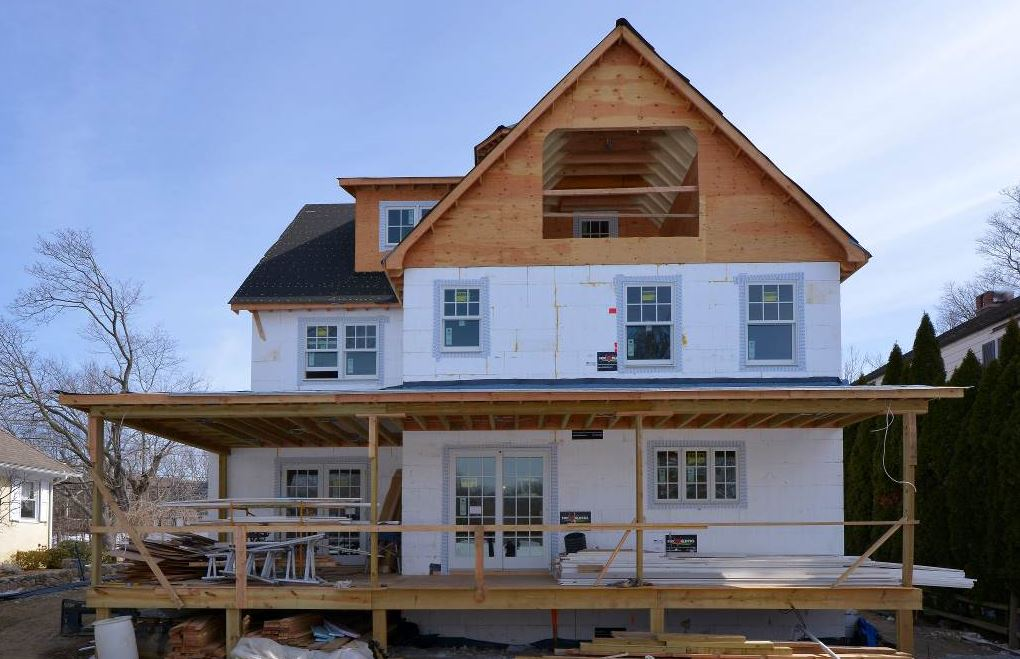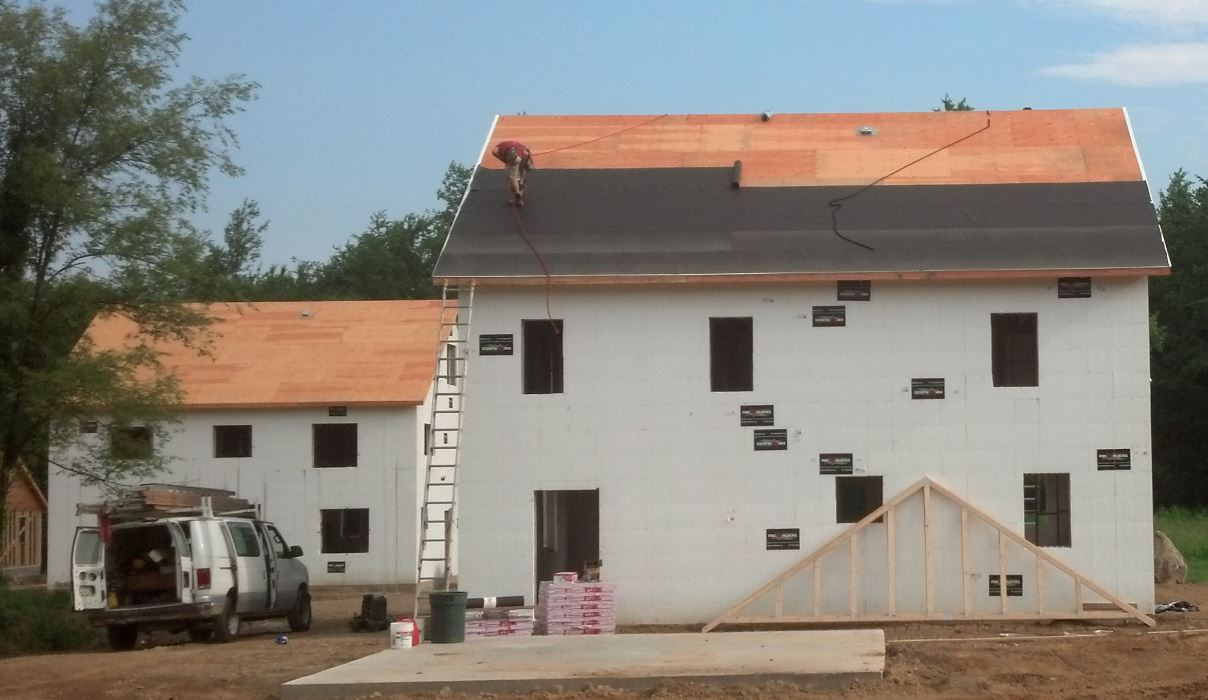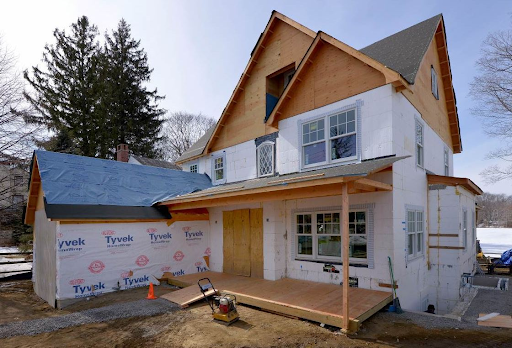
11 Benefits of Concrete House Construction

Concrete house construction provides homeowners with many benefits, including energy-efficiency, durability, and low-maintenance. Also, concrete homes create a safe, comfortable, and healthy environment, along with contributing positively to the environment. Many of these benefits provide homeowners with long-term financial savings.
Concrete Block vs. Insulated Concrete Forms

Two wall systems commonly used to build concrete homes include concrete blocks and insulated concrete forms (ICFs). Both methods furnish the many benefits of concrete house construction. However, unlike ICF walls, concrete blocks provide little thermal resistance, so to achieve sufficient energy-efficiency, the walls require an application of insulation. In addition, builders can easily and quickly construct an ICF wall, compared to complicated and time-consuming concrete block construction. The lack of thermal resistance and the complexity of concrete block construction make ICF the best way to construct below and above grade walls for any home.
Benefits of Concrete House Construction
1. Energy-Efficient Houses
The high thermal mass of tightly sealed concrete walls, along with insulation, prevents drafting and creates an airtight high-performing, energy-efficient home.
Concrete mass slows the movement of heat through a wall compared to wood. So, a concrete home will stay warmer in the winter and cooler in the summer than a wood-framed house with the same amount of insulation. Concrete also limits air leakage, compared to wood-frame construction - air leakage accounts for the most significant percentage of energy loss in a home.
2. Resists Rot, Rust, and Insects
Concrete home construction provides a more durable wall system over wood and steel. Concrete walls do not rot when exposed to moisture by wind-driven rain, diffusion, or airflow. Unlike steel, concrete does not rust when exposed to moisture.Concrete walls resist termites. Unfortunately, termites can destroy wood houses and cause thousands of dollars in repairs.
3. Creates Low Maintenance Homes
Concrete construction creates low-maintenance homes with wall systems that hold their shape and integrity for decades.The exterior of a concrete wall more effectively resists damage from wind and heavy rains than a wood-frame wall. Typical facades for a concrete wall include stucco, brick, or a concrete texture product - none of these products require painting. A solid and robust exterior concrete wall won’t dent, and therefore resists damage from hail and flying debris.
4. Fire Resistance
Fire-resistant concrete walls more effectively resist damage from fire and limit the spread of flames, compared to wood and steel. During a fire, steel can melt, and wood can burn.
5. Earthquake Resistance
Homes built with steel-reinforced concrete walls provide the stiffness, strength, and ductility to withstand the destructive forces of earthquakes. Reinforced concrete walls resist the compression and tensile forces produced by an earthquake. A study at Construction Technology Laboratories (CTL) found that a lightly reinforced concrete shear wall has over six times the racking load resistance of a wood-framed wall.
Unfortunately, while the flexibility (ductility) of a wood-frame provides some protection during an earthquake, it does not provide enough strength to keep the connection between the foundation and walls secure.
6. Wind Resistance
Concrete construction produces homes that can stand up to the severe winds of a hurricane or tornado. In fact, researchers at the National Wind Institute of Texas Tech University found that the strength of concrete walls can withstand 250-mile-an-hour winds and flying debris.
7. Healthy Homes
Concrete houses provide healthy environments with fewer airborne allergens, molds, and toxins than most wood-frame houses. A concrete wall system limits the infiltration of outside allergens to the inside of the house. Concrete resists mold and mildew more than wood. Mold can cause headaches, severe respiratory infections, and immune system disorders. Concrete emits less volatile organic compounds (VOC) than wood. VOCs can irritate the throat, eyes, and nose. VOCs can also cause nausea, headaches, and damage to the kidney, liver, and central nervous system.
8. Produces Excellent Acoustics
The mass and rigidity of concrete more effectively reduces the transmission of unwanted noise and sound in a home more than other building products, like steel and wood.
9. Design Flexibility
Concrete allows architects tremendous flexibility with their designs. The free-flowing nature of concrete permits architects to incorporate more unique shapes and custom features into their home designs, than wood and steel houses.
Also, builders can easily adjust the concrete walls for a home during the construction process without delaying production.
10. Environmentally Friendly
Concrete house construction creates minimal waste because the manufacturer can produce exact amounts of concrete for a project. Also, builders can break recyclable concrete down to rubble and reuse for other construction projects.
Concrete offers several other green benefits:
- Uses less energy to heat and cool.
- Acquiring and manufacturing of materials comes from local sources, reducing transportation energy.
- The service life extends the time between reconstruction, repair, and maintenance - and thereby, the associated environmental impacts.
- Absorbs CO2 throughout its lifetime which helps reduce its carbon footprint.
- The production of concrete uses much less energy (0.33 percent of energy consumption in the U.S.) compared to steel (1.8 percent) and wood production (0.5 percent)
11. Long-Term Economic Advantages
While concrete houses can cost more to build than wood-frame houses, concrete homes save money over time with lower utility and maintenance expenses. Concrete homes provide excellent protection from fires, severe weather, and break-ins. Therefore, homeowners of concrete houses may obtain a lower home insurance rate than those with wood-frame homes. The design often allows for smaller-capacity equipment for the heating, ventilating, and air-conditioning - a further savings for homeowners. Concrete homes often provide an increase in resale value over their wood-framed neighbors.
The Best Way to Build a Concrete Home

Concrete Block vs. ICF
The many benefits of concrete make it an excellent option for new home construction. However, the best way to build a concrete home must consider both the demands of the builders and the homeowners.
For the builder, the best concrete house construction should save time and money during the building process and also limit construction risks.
For the homeowner, the best concrete house construction should create a high-performing energy-efficient durable, and low-maintenance home. In addition, the concrete house must provide safety and excellent indoor environmental quality. Concrete houses provide long-term savings and positively impact the environment.
Two wall systems commonly used to build concrete homes include concrete blocks and insulated concrete forms (ICFs). Both methods furnish many of the benefits of concrete house construction. However, the complexity of concrete block construction and its lack of thermal resistance make ICF the best way to construct a concrete home.
ICF allows builders to simply and quickly construct a concrete home
Concrete block house construction has become increasingly complex as it struggles to keep up with today’s demands for more energy-efficient, durable, and fire- and wind-resistant wall systems. Unfortunately, instead of improving on the block, manufacturers and contractors added more steps to the concrete block construction with extra components and layers. These changes all cost builders more time and money and a higher possibility for errors during construction.
Fortunately, Fox Blocks ICF home construction allows the contractor to more quickly and easily construct a concrete home, than one made with concrete block. Fox Blocks all-in-one wall system combines five building steps into one, including insulation, structure, air barrier, vapor retarder, and attachment. This feature saves time and money because it expedites construction by removing the need to hire and synchronize multiple trades.
Unlike concrete blocks, ICF provides high thermal resistance
Concrete blocks alone provide little thermal resistance. For example, an eight-inch thick block has a thermal resistance value of only between R-1.9 and R-2.5. Therefore, concrete block construction requires a builder to apply insulation to achieve sufficient thermal resistance.
Fox Blocks ICFs offer a better solution for building an energy-efficient concrete home. Fox Blocks contain high thermal mass that provides continuous insulation and lessens air and moisture infiltration. Fox Blocks ICF construction has an R-23 rating that meets, if not surpasses, the standards and codes of the ASHRAE 90.1 and 2018 IECC.
Five More Reasons Fox Blocks ICF is the Best Way to Build a Concrete Home

1. Durable and Low-Maintenance
Durable Fox Blocks furnish a solid continuous monolithic concrete wall with a perm rating lower than 1.0 - a feature that controls moisture intrusion and prohibits the growth of mold that can damage the integrity of the home and lead to expensive and time-consuming maintenance.
2. Disaster-Resistant
Fox Blocks, with steel-reinforced concrete, can protect a home from tornado and hurricane winds exceeding 200 MPH, and projectile debris moving over 100 MPH.The shear walls extend the entire height and all sides of the building - which protects against earthquakes. Fox Blocks protect the home and its occupants from fire by achieving a fire-resistance rating (ASTM E119) of 4 hours for the 6-inch blocks and 2 hours for the 4-inch blocks.
3. Good Indoor Environmental Quality
The Fox Blocks wall system, with a Sound Transmission Class (STC) rating of STC 45-50+, significantly reduces the transfer of sound from the exterior to the inside of the house. Fox Blocks create a healthy home because the blocks control moisture intrusion, and limit the growth of unhealthy mold. In addition, Fox Blocks contain little to no VOC.
4. Lessens a Homeowner’s Long-Term Costs
Disaster-resistant Fox Blocks ICF reduce the need for expensive repairs or even rebuilding after a natural disaster, like a wildfire or hurricane. Long-term expenses can be reduced by prohibiting damaging mold that can lead to costly repairs, decreasing monthly utility bills, and because they are high performing energy-efficient homes, they will retain a higher resale value.
5. Helps the Environment
- Contains at least 40 percent recycled content by weight
- Does not use any gases that deplete the ozone or are harmful to the ecosystem during manufacturing
- Reduces the amount of building waste, dust and air pollution in the construction process
- Helps to contribute toward LEED points for the project
- Every Fox Blocks project, when tested by an Energy Rater, met and surpassed the ENERGY STAR home standards and obtained a Five-Star Rating
- The parent company of Fox Blocks, Airlite Plastics, practices ZERO plastic landfill contributions
The many benefits of a concrete house make it a wise choice for new home construction. Concrete construction creates energy-efficient, durable, low-maintenance, safe, and healthy homes. Concrete homes also provide long-term savings and contribute positively to the environment.
However, for two reasons, Fox Blocks ICF provides the best way to construct a concrete home, compared to concrete block - Fox Blocks ICF is more thermal-resistant and easier and quicker to construct than concrete block construction.
Please contact the Pros at Fox Blocks for more tips on the benefits and best ways to build a concrete house.